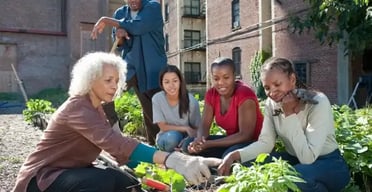What is the Community Resiliency Model?

Mirroring the push towards trauma-informed and ACEs-based treatment, the Community Resiliency Model (CRM) arrived on the Connecticut behavioral health scene several years ago. CRM was developed in California by the Trauma Resource Institute as a way to “help adults and children learn to track their own nervous systems in order to bring the body, mind and spirit back into greater balance” all while encouraging clients to share their newfound skills with their friends, family, and peers.
An introduction to the Community Resiliency Model
In Introduction to the Community Resiliency Model, a video produced by the LA County Library system, Christian Brown details the difference between resiliency-based and trauma-informed approaches, saying, “Trauma-informed [care] says, ‘people are suffering’ [and asks] ‘What happened to you?’” In contrast, resiliency-based response says, “people are resilient... any person can learn self-regulation skills based on science and biology.’ [and asks] ‘What are your strengths?'"
The efficacy of CRM is still being explored; however, recent studies indicate that CRM skills could unlock new pathways for treatment and prevention. In a survey submitted to the Department of Behavioral Health San Bernardino County through the CA Mental Health Services Act, over 60% of participants believed that the tools would help to reduce stress, while 67% indicated the skills could help with depression and 82% pointed towards its impact on anxiety.
The Trauma Resource Institute underlines the power of CRM to address the needs of individuals and communities who have been underserved due to financial strife, ethnicity, and/or natural or human made disasters. A point which can partly be credited to the minimalistic nature of CRM. Once CRM skills are gained, they serve as a tool you can carry with you forever regardless of personal or community resources.
We invited Rebecca Lemanski, MSW—one half of The Community Resiliency Model (CRM)® Skills Workshop training team—to share her thoughts on the nature and potential of CRM.
Why do you think that CRM skills are important for public health professionals?
CRM skills are important for public health professionals because CRM is a public health model that promotes health and healing. The skills can be used by individuals for self-care, by peer helpers, and across systems at the agency, interagency and community levels. CRM skills are accessible to people of different cultures and ethnic backgrounds and are useful in a variety of contexts – inside an office or home, or ‘out in the field.’ There are also many attractive educational materials that reinforce the wellness skills – for example, there is the iChill app (free), wristbands, and pocket cards.
What did you want the main takeaway of your training to be?
 The main takeaway I would like is for everyone to shift away from ’trauma-informed’ and move to ‘resiliency-focused’. For example, a resiliency-focused system identifies programs and best practices proven to build resiliency at both the individual and the systemic level, it instills a shared vocabulary and skills for resiliency into every aspect of the system’s life, and it improves the health of the entire system by promoting resilience, health, and growth in ongoing ways. It asks the questions: ‘What is right with you?’ and ‘What are your strengths?’
The main takeaway I would like is for everyone to shift away from ’trauma-informed’ and move to ‘resiliency-focused’. For example, a resiliency-focused system identifies programs and best practices proven to build resiliency at both the individual and the systemic level, it instills a shared vocabulary and skills for resiliency into every aspect of the system’s life, and it improves the health of the entire system by promoting resilience, health, and growth in ongoing ways. It asks the questions: ‘What is right with you?’ and ‘What are your strengths?’
What are the core elements of CRM and how do they impact a clinician's approach to treatment?
The Core elements of CRM include the following:
-
"A set of six wellness skills: (1) Tracking, (2) Grounding, (3) Resourcing, (4) Gesturing, (5) Shift & Stay and (6) Help Now! -used to bring our bodies, minds and spirits back into a state of balance
-
CRM teaches skills to help anyone across the lifespan who is experiencing stress and/or traumatic stress reactions
-
CRM is a wellness practice
-
CRM teaches us that it’s about biology, not human weakness
-
Human beings are resilient and most are able to bounce back after difficult experiences”
And, CRM skills can impact a clinician’s approach to treatment in the following ways:
-
Offer the clinician more tools to put in their toolbox to use with individuals and families who are going through hard times or who have experienced or are experiencing stress or trauma
-
Clinicians will learn an approach that teaches us to remain one step behind people, meaning that they will be taught to follow the person’s lead and use invitational language vs. directional language (a huge mindset shift for some)
-
Clinicians will learn that they do not have to interpret or assume meaning from anything, they simply guide a person gently to become aware of the present moment by focusing on sensations of wellbeing.
We hope that clinicians can develop a shared understanding of the impact of trauma and chronic stress on the nervous system, as well as how resiliency can be restored and increased using this skills-based approach.
Subscribe for updates
_.webp)



